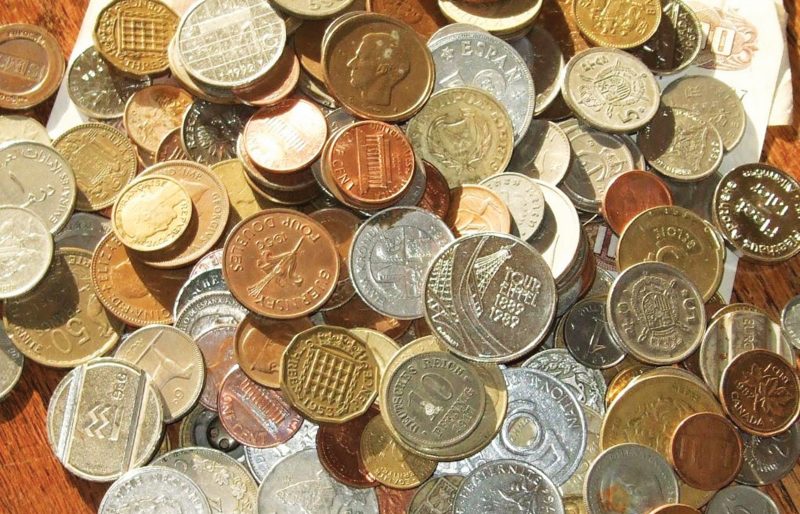“That’ll be 1.58 altogether,” said the lady behind the counter. This was at a bakery in a southern suburb of Manchester, where I was buying some custard tarts during one of my rare return visits to the city of my birth and childhood. I delved into my pocket and pulled out a handful of coins, only to stare at them in bemusement. I hadn’t thought the thing through, that was obvious. I had been out of the UK for so long, since way before decimalisation* of the currency in 1971, and the coins I now held in my hand were unrecognisable to me. Picking each coin up and examining it for its value wasn’t working due to a combination of pointless vanity and limited pocket space, which had stopped me taking my reading glasses with me and prevented me now from being able to read the numbers on the coins. The lady continued to gaze at me with her own brand of bemusement.
“May I…?” she ventured, lifting a suggestively helpful hand.
And she deftly picked out the right number of coins.
“I’ve been…er…away for quite some time…” I said awkwardly. She just smiled. She could tell from my accent that I was a local boy, so she probably assumed I had been in prison for close to 30 years.
This was just one of many odd situations I have experienced while visiting my home country during many decades of life as an expat. Manchester was once home to me, but I doubt it ever could be again, and it certainly wasn’t during that visit in 1999. We still had the family house, where I had spent the final years of my childhood, with its characteristically British cold bedrooms, a bathroom with obstinately separate hot and cold water taps, and an electric water heater. However, I did enjoy being there. It was good to be with my aging parents again, being spoiled by them with bacon, sausage and eggs, pork pies, fish and chips, beans on toast, and all those childhood favourites. But I was in for some surprises.
Following a process of simple deduction, it must have been the end of October that year when the doorbell rang. When I opened the door, a mousy-looking little boy mumbled “Trick or treat.” I didn’t know quite how to respond to this, so I consulted a higher power – my dad.
“Just tell him no thank you.”
So I gave the kid a number of the new-fangled coins and, with his face bent over his hand, he left without a word.
To me this short episode was bemusing. “Trick or treat”? Where had that suddenly come from? I reckoned if I’d tried that as a kid I’d have been told to get lost in no uncertain terms. I supposed it was just another product of the television culture, like Valentine’s Day.
After I left England and before I came to Indonesia, I lived in the Netherlands for well over a decade, and it was there that I had learned to drive and obtained my first driving licence. With all the regulations and road-signs I’d learned to live with, I was, I suppose, a quite cautious, even timid, driver. But all that went out of the window when I subsequently started driving in Jakarta, and it stayed out when I brought my driving skills back to Manchester many years later through the medium of my dad’s car – plus the steering wheel was on the wrong side. All the opportunistic weaving and overtaking I got used to in Jakarta were a boon in the docile Manchester traffic. It was quite a lot of fun for me, although my fellow road-users probably didn’t see it the same way. It was especially useful when queuing for entrance to the Manchester United football stadium at Old Trafford. Squeezing with almost paint-removing closeness past other vehicles, getting my front bumper ahead of theirs and forcing my way into the queue in front of them were things I’d never even dreamt of doing in the Netherlands. I suppose I can count myself lucky I didn’t get involved in any fights or get pulled over by the police on other occasions for red-light jumping and/or dangerous driving in general. One notable problem I encountered was reversing into impossibly confined parking spaces – not generally a necessity in Jakarta at that time.
Another shock came when I returned to the Netherlands for a visit after a long period in Indonesia and attempted to use the public transport. The fault was mine, obviously, but I never found out where to obtain the various kinds of ticket that one requires. They were not obtainable on the buses or trams themselves, though trains and the metro had ticket-machines, for many of which one required the elusive “chip-card”. I was advised that I could “get them anywhere,” which to me was a little too general than was helpful. One positive result of this was that I walked a lot and lost considerable excess weight.
Some other examples of what I can only call “reverse culture shock” in the UK were very minor; I would, in Muslim fashion and by force of habit, transfer anything I wanted to give to someone from my left hand to my right hand to avoid causing offence. Another was when in shops, being over-explicit or repetitious about what I wanted, as is required in Jakarta. I met more than once with an impatient “Yes, I think I’ve got the idea, sir,” or other variants in my home country.
But one thing bothered me more than anything else. It was the practice of fast-food places expecting customers to dispose of used plates and cups, etc themselves. Even though it had always been the practice when I still lived in England, and I had thought nothing of it, it came over to me now as tantamount to an insult. As a way of cutting costs, they were using customers to do half their work for them and charging the earth for the food they served. Similar fast-food joints in Jakarta expect no such service from their customers. It is their staff’s job to clean up, as it should be. Well, fine, it was a subjective view, which didn’t stand up to challenge – the challenge in this case coming from my aged and ailing dad picking up both trays and shuffling over to the disposal bins. Subsequent visits to these places saw me knuckling under to the accepted fast-food norm while grumbling under my breath. I could, in the same plaintive breath, point to supermarket shopping and the responsibilities laid at their customers’ door, such as the unloading and packing of purchases at the checkout counter, but I won’t bother. Long-term expats in Indonesia who return home more frequently than I will need no reminder.
*Until February 14, 1971, the British currency consisted of pounds, shillings and pence (pennies). There were 12 pennies to the shilling and 20 shillings to the pound. The following day Britain “decimalised” its currency and the pound was made up of 100 new pence.




